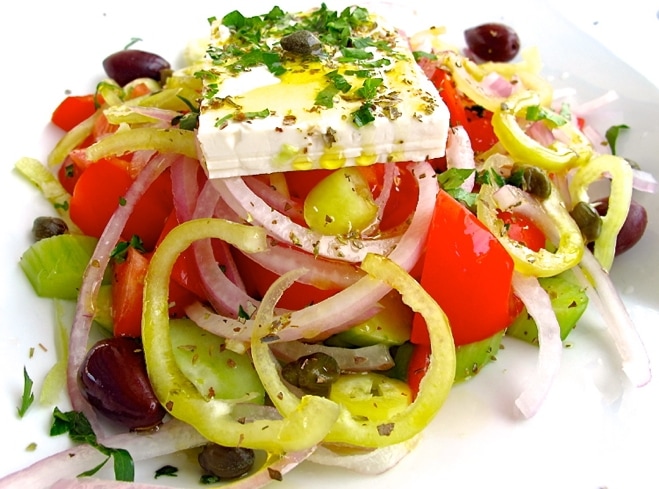The Mediterranean diet can save you money

One of the most common questions I get asked is if the Mediterranean diet is expensive. Many people think the Mediterranean diet is pricey, and the media also perpetuates this idea (US World Report’s experts characterize it as expensive). It is not. I wrote a post a few months ago showing exactly how much more one can save by eating a traditional Greek-Mediterranean diet. But, I was happy to see this new study that was published in the Journal of Environmental Nutrition which basically showed that individuals who participated in a six-week cooking program and followed simple, plant-based, Mediterranean style recipes decreased their total food spending, purchased healthier food items and improved their food security.
Mary Flynn, Ph.D., RD, LDN, the study’s lead author and a research dietitian at The Miriam Hospital in Rhode Island designed the study with Andrew Schiff, Ph.D., the CEO of Rhode Island Community Food Bank. The study is based on Flynn’s research of a plant-based diet she developed that emphasizes cooking with olive oil and follows a Mediterranean diet pattern.
Flynn said that she had many of her patients from another breast cancer weight loss study tell her how inexpensive a Mediterranean-style diet was, so she approached the food bank about designing a study using food pantry items for the recipes.
The study
A total of 83 clients were recruited from emergency food pantries and low-income housing sites for the 34 week study. Sixty-three completed the diet protocol and the six-month follow-up requirement. Participants attended six weeks of cooking classes, where instructors prepared quick and easy plant-based recipes that incorporated ingredients like olive oil, whole grain pasta, brown rice and fruits and vegetables. The participants were then followed for six months after the cooking program ended.
All cooking class participants were provided with a bag of groceries that contained most of the ingredients to make three of the provided recipes for their family members during the six weeks of the cooking classes. Grocery receipts were collected throughout the study and researchers observed significant decreases in purchases of meat, carbonated beverages, desserts and snacks, even though staff never instructed participants not to purchase these items. At the same time, there was an increase in the total number of different vegetables and fruits consumed per month.
According to Flynn not only did the study participants cut their food spending by more than 50%, saving nearly $40 per week, but they also gained some health benefits; approximately half of all participants lost weight, which was not a study objective, and there was an overall decrease in body mass index, or BMI.
Take home messages from this study
- A Mediterranean style diet can save you money
- A Mediterranean style diet can be followed anywhere and by anyone (the study took place in Rhode Island)
- A Mediterranean style diet is also good for your health
I think most of us already know this, but it’s always good to have studies like this that confirm it.

What ingredients are in the salad pictured on this page?
Susan, this is a photo of a Greek salad, check this link for the recipe: https://www.olivetomato.com/greek-salad-how-to-make-it-how-to-eat-it-why-its-good-for-you/
@Maria, it all really depends since a lot of the recipes are using fresh produce but I primarily cook Greek meals at home and to help with that I always have frozen produce (like peas, green beans, okra) on hand and also buy bunches of fresh herbs (parsley, mint, dill) that I clean, chop, and store in the freezer. In addition to those some other important staples are extra virgin olive oil, onions, garlic, potatoes, carrots, tomato paste/puree. I’d add lemons as well, I always have lemons on hand just in case, or red wine vinegar at least. Legumes like white beans (large lima, northern, canellini), lentils, chick peas, and black eyed peas are handy to have around too. As far as spices/seasonings the most common are salt, pepper, and oregano. Fresh herbs are used very generously as well. I often use cinnamon, cloves, and cumin but mostly for meat dishes and red sauce. Oh, and of course feta cheese is a great accompaniment to most Greek vegetarian dishes. Not sure if I’m forgetting anything important, but with the previous ingredients you can make a good number of stewed vegetable and/or bean dishes. Good luck! With Elena’s great blog/recipes you’ll find a lot to prepare!
Thank you Angela! Excellent tips.
Maria, I will posting soon about staples of the Greek/Med diet, you may find some useful information in the vegetarian category as well as “What Greeks Eat”.
Love that Greek salad photo. Feta is one of my favorite cheeses. Lots of benefits from eating more Mediterranean. Don’t forget the wine…
Yes! Yes of course the wine enjoyed with meal, with family or with friends.
What are good common staples of a Greek/Mediterranean household, so that it will be easy for the individual to make almost any Greek recipe at any time?